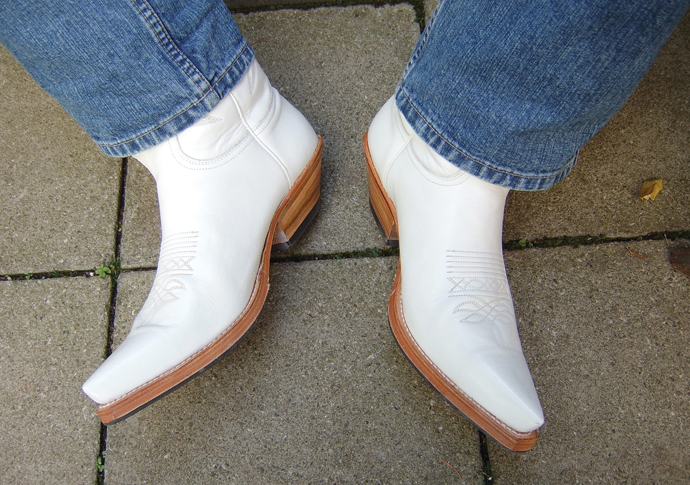Boot legging it
Memories of local rogue Tom Gill* lead Emma Goldman to ponder the appeal of theft. *Names have been changed to protect the guilty
Thursday, 5th January 2023 — By Emma Goldman

PHOTO: BUNDT/PIXABAY
AS a 17-year-old in the home counties, I frequented a pub called The Anchor. Eight minutes away by train, it was in the neighbouring, larger town, a metropolis in my eyes. Tom Gill was one of the pub’s regulars. Tom Gill was 25 – a quarter of a century, we used to tease. Like others I knew, he signed on the dole, didn’t work, and never intended to work.
Tom Gill had raffish, shoulder-length hair. He wore a tan leather bomber jacket. Cowboy boots pointed out from the flares of his jeans. Like many others, he was of no fixed abode. He operatically claimed to have left home 23 times. He squatted, stayed with friends, slept in the abandoned van in the pub car park or, in the summer, hung out in the woods.
I had known of Tom Gill and his friends a year before actually meeting them.
At school, our headmistress had called an assembly. As usual, she was dressed in black, her long dress only emphasising that, like 4ft 11ins Queen Victoria, her width equalled her height. Over half-moon spectacles, she warned us girls not to go near the fence circling the playing fields on account of the “strange men” beyond it rumoured to be living in those woods.
The strange men were Tom Gill and other voluntary, middle-class homeless, embracing a home counties version of the hippiedom born in San Francisco two decades earlier. They rejected conventional society. One of Tom Gill’s friends was Paul Afghan, called thus on account of his never-removed Afghan coat. His parents only cared about money, he said, he called them “bread heads”. A song writer, he complained about the “fascist b*******” running EMI who failed to respond to the cassette recordings he posted to them.
“Fascist” was a term much bandied about. Other fascists were the pub landlord when he demanded payment for drinks bought on tic, the bureaucrats at the dole office, and the law-enforcing police. The police, however, might have had it in for Tom Gill and his friends, but they also missed crimes committed right under their noses. Tom Gill’s procurement of cowboy boots was one.
Whenever his old boots began letting in water, he went to the town shoe shop. Trying on a new pair, he walked up and down testing for comfort, all the while edging towards the door. Then, leaving the old ones abandoned on the floor, he shot out and raced down the high street to The Anchor.
“Since all property is theft,” he said over a Guinness. “I’m striking against the capitalist system. And the fascists in charge of it.”
We accepted his assessment of himself as a revolutionary. We thought him a criminal mastermind on a par with McCavity. But when I later moved to London I wondered how he had got away with it, the pub being just 200 yards from the shop.
The other day, early to meet a friend in the borough, I was reminded of Tom Gill. Needing to kill time, I pushed at the door of an upmarket clothes shop, intending to browse the colourful, unaffordable clothes. The door, however, was locked. An assistant arrived with a jangling bunch of keys.
“We’ve had a spate of thefts recently. People running out and not paying. Cost of living crisis I suppose.”
High-end clothes shops are not what most people think of when they consider the cost of living crisis but, like a lot of us, the assistant may have been living in a bubble.
A café I sometimes frequent regularly has people trying to get away without paying. The owner says they just get up and walk away, especially when sitting at outside tables.
These culprits are of no particular age or gender. When she runs and catches up with them, they claim they forgot about the bill. Not radicals striking a blow against the system so much as well-heeled opportunists. Yet why risk a criminal record for the sake of a smoothie and avocado toast?
At my local food store, I recently saw a middle-aged woman being stopped. She apparently hadn’t paid for the packet of salmon in her handbag. The security guard made her return to the till. Unlike the café opportunists, she was unapologetic.
“It’s not my problem it didn’t scan at self-service, mate.”
Years ago, I had a Christmas job on a perfume counter in a department store in town. I had a boss so subservient to the buying public she practically curtsied to each customer.
“What would Ma’am like today?”
But when a sudden power cut brought darkness, the enunciated vowels vanished and, as she screeched at us through the black air, her true opinion of customers was revealed.
“Stand by yer stock!”
Perhaps her mistrust was well-placed. Perhaps such mistrust always has been. Although at least Tom Gill laid claim to a higher calling.
• Emma Goldman is a teacher in Islington.